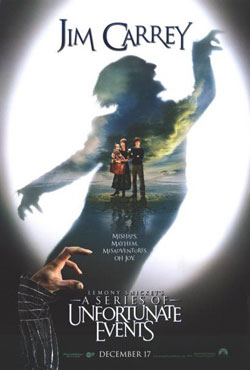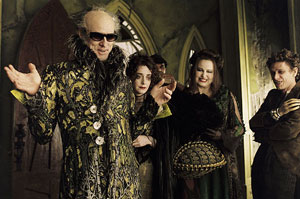 As the Harry Potter films get farther into the book series, the filmmakers are presented with the challenge of condensing hundreds upon hundreds of pages into a two hour movie. Daniel Handler’s Lemony Snicket’s A Series of Unfortunate Events presents the opposite problem – clocking in at a few dozen pages per volume, the filmmakers had to use three of the books to make the film adaptation hitting screens this weekend.
As the Harry Potter films get farther into the book series, the filmmakers are presented with the challenge of condensing hundreds upon hundreds of pages into a two hour movie. Daniel Handler’s Lemony Snicket’s A Series of Unfortunate Events presents the opposite problem – clocking in at a few dozen pages per volume, the filmmakers had to use three of the books to make the film adaptation hitting screens this weekend.
Director Brad Silberling did what I had hoped for but never expected – he managed to keep the tone and humor of the books, which are intensely literary. That may sound weird when talking about very slim books for kids, but Handler’s work is rooted in a playful love of language, while JK Rowling’s Potter books are more about plot and incident, lending them more easily to adaptation. Much of the credit must certainly go to Robert Gordon, whose screenplay shrewdly includes some of the better wordplay elements of the books (but not quite enough, sadly. People defining words in strange or off-kilter ways is one of my favorite things about the Snicket books) and keeps the narration of Lemony Snicket himself, a delightfully dour reporter played by Jude Law here.
The Lemony Snicket books are dark affairs, and Silberling has built a Roald Dahl-esque world every bit as dark as Handler’s goofily morose prose. It’s a place caught somehow in between Victorian England the 1950s suburbia, a place totally taken out of time and while there is no magic per se, there are things that are slightly fantastical, like the carnivorous Lachrymose Leeches (“Lachrymose” being a word that in this instance means inclined to weeping, and the name of a Lake that features in the story). It’s in this world that the three Baudelaire children – Violet, the eldest and an inventor, Klaus, a bookworm with photographic memory and Sunny, an infant with an extraordinary bite – live, and in the first few moments of the film become orphans when their parents are killed in an enormous and mysterious fire.
They get shuttled off to live with their Count Olaf, a terrible and pompous actor who is only after them for their money. While they get rescued from the Count’s clutches and get sent to a series of other “relatives” (most of whom seem to have no relation to them), Olaf is never far behind, always looking to get his hands on the kids and their fortune, no matter who he must kill.
As you can tell from the description, the Series of Unfortunate Events aren’t just titular – things get grim, and good for Silberling and Paramount for letting them go there. It’s easy to make a movie that looks dark without having any darkness to it, but this is a film with a core gloominess and sadness and danger that feels real. You know that the kids won’t die, but you realize that everyone else is fair game. After too many years of kids movies where the  biggest thing on the line was the softball playoffs or acceptance by kids in your class, it’s nice to see a movie that gets back to some life and death, kids in peril stuff that we all thought was out of fashion.
biggest thing on the line was the softball playoffs or acceptance by kids in your class, it’s nice to see a movie that gets back to some life and death, kids in peril stuff that we all thought was out of fashion.
When the film was being made my biggest fear was the casting of Jim Carrey as Count Olaf. Suffice it to say that 2004 is the year that will go down in history as the one where I loved Carrey in two roles. Olaf is perfect for the Ass Talker side of Carrey, and since the character is supposed to be an awful actor and self-important prick, Carrey’s real life traits only help. I can’t take that schtick in a character I’m supposed to like, but if the character is one I’m rooting against – well, it just makes it easier to root against him.
What really made me realize how good Carrey was in this film was the way that it felt deflated when he wasn’t in it. While other tremendous actors like Timothy Spall,
Billy Connolly and Meryl Streep create great and bizarre characters, Carrey’s Olaf breaths fetid life into every scene he’s in. It certainly helps that his entourage of bad actors includes people like Luis Guzman and Happiness’ Jane Adams. But even when he’s alone, dressed as an improbably Italian or a ludicrous sailor, Carrey owns every moment.
He has some fine child actors to work with. Emily Browning as Violet is brilliant and uncomfortably beautiful. When I saw about thirty minutes of the film last month I was worried that Liam Akin as Klaus would be dead wood, but in the actual film he works. And the baby Sunny is just a scene stealer, whose reaction shots (and comic subtitles for her  baby talk) could easily become a cheap shot for Silberling, but he doesn’t overuse her innate and insane cuteness.
baby talk) could easily become a cheap shot for Silberling, but he doesn’t overuse her innate and insane cuteness.
The film loses some steam just before the end, but it gets its energy back with a blast of manic fun that leads to a completely satisfying ending which still leaves things open for the future sad stories of the doomed Baudelaire children (there are about 9 or 10 more books published so far) – but it does take a moment to hammer home the sheer moroseness of their situation. So while the movie ends on a happy enough note, it makes sure that you’re aware that, even if there are no more films, things won’t be getting any better for those kids anytime soon.
Now that’s a holiday season message I want in a kid’s film. Between Harry Potter and the Prisoner of Azkaban and Lemony Snicket 2004 is a banner year for dark and fun kid’s films.
9.0 out of 10